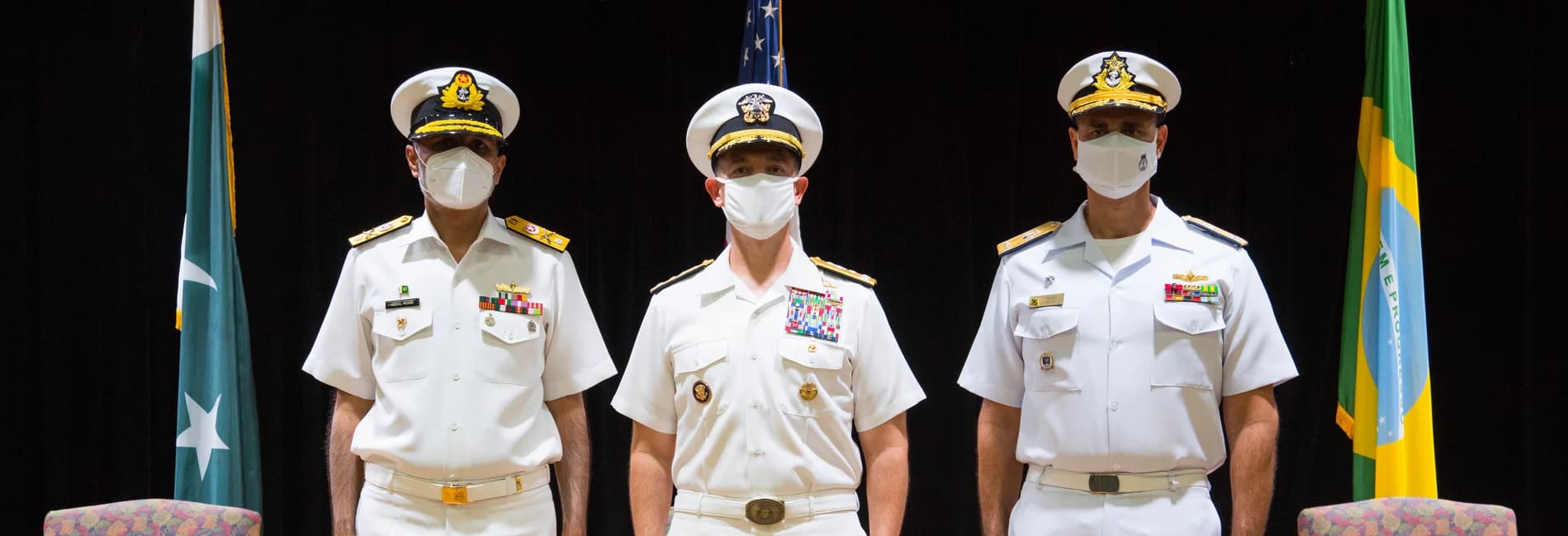On 9 June 2021 the Brazilian Navy (Marinha do Brasil) took over the command of Combined Task Force 151 (CTF-151) during a ceremony at the Combined Maritime Forces (CMF) headquarters in Manama, Bahrain. The CMF are a multinational naval force led by the United States, counting on 34 nations from 6 continents. Altogether the CMF’s three separate task forces (CTF-150, 151 and 152) cover a total of 3.2 million square miles (approximately 8.3 million square kilometres) of international waters.
During the event, led by US Navy Vice Admiral Brad Cooper (Commander, United States Naval Forces, Central Command/Commander of the 5th Fleet and CMF Commander), Brazilian Rear Admiral André Luiz de Andrade Felix assumed command of CTF 151 from Pakistani Commodore Abdul Munib Si in a historical moment for Brazil and Latin America. This is because Admiral Felix has officially become the first Latin American commander to lead this mission, which also counts on other 22 officers from around the world (10 Brazilian, 2 Bahraini, 2 Italian, 1 Japanese, 2 Jordanian, 1 Kuwaiti, 1 Omani, 1 Pakistani, 1 South Korean, 1 Turkish). He will command CTF-151 until November 2021, when a Jordanian Admiral will take the helm.
It is important to highlight that Brazil’s participation in the mission helps strengthen global cooperation and enhance regional expertise for future missions. To this extent, Read Admiral Felix emphasised in our interview that ‘the decision to participate in the CTF-151 is relevant to reinforce Brazil’s position as an actor capable of contributing positively to the effort to maintain and secure sea lines of communication and the freedom of navigation.’
In the midst of a complex, geopolitically sensitive region, multinational cooperation at a global scale has proven effective in restoring order and allowing commercial shipping to navigate free from piracy and other illicit activities. Basing its mandate on the United Nations Convention on the Law of the Sea (UNCLOS) and the United Nations Security Council Resolutions 1846 (2008) and 1851 (2008), CTF-151 has played a key role in combating piracy and armed robbery in the Gulf of Aden, the Somali basin and the Southern Red Sea since 2009. Besides CTF-151, other multinational missions patrol this vast area, such as the European Union Naval Force (EUNAVFOR) Somalia — Operation Atalanta (TF-465), which has a broader mandate than that of countering piracy. Indeed, TF-465 also combats the trafficking of illicit weapons, drugs and the trafficking and smuggling of human beings. According to Rear Admiral Felix, ‘CTF-151 and TF-465 coordinate their efforts for mutual support and to avoid that ships and aircrafts operate in the area at the same time.’
It is important to mention that Brazil has already led a Multinational Task Force before. From February 2011 until January 2021, a Brazilian Admiral commanded the Maritime Task Force of the United Nations Interim Force in Lebanon (MTF/UNIFIL) in the Eastern Mediterranean, which also counted on a Brazilian frigate from November 2011 until December 2020. UNIFIL’s MTF is the first naval task force of a UN peacekeeping mission. Moreover, Rear Admiral Felix himself was Chief of Staff of the 9th and 10th Brazilian Contingents of UNIFIL from February 2015 to February 2016, and Brazil was the country which led the MTF for the longest period.
Finally, Rear Admiral Felix stresses that Brazil’s role in the CMF has always been proactive since the Brazilian Navy started participating 8 years ago. Perhaps, this experience together with that gained in the UNIFIL mission will aid the Brazilian Navy to navigate more effectively complex future missions, such as a potential Multinational Naval Taskforce in the Gulf of Guinea (GoG), located in the South Atlantic and within the Brazilian Strategic Environment (BSE).
All in all, this experience suggests that it is time to look at the oceans as a single “world ocean,” where allies face common challenges together. The Brazilian Command of CTF-151, so distant from its own South Atlantic waters, stands out as a good example of multinational cooperation that could be emulated by other nations.
Full interview with CTF-151 Commander, Rear Admiral André Luiz de Andrade Felix, is available here.
***
- Leonardo Mattos is a Retired Brazilian Navy Captain and Geopolitics Professor at the Brazilian Naval War College.
- Melissa Rossi is a researcher at the Brazilian Naval War College and EGIC Steering Committee Member.








